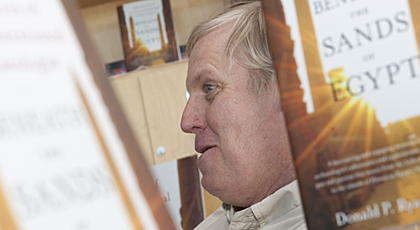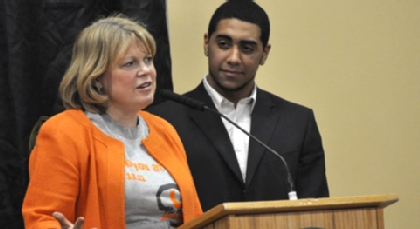Page 891 • (9,420 results in 0.076 seconds)
-
moved to the U.S. at the age of 31 and began to write in English at 35. He earned his MFA from UT Austin’s New Writers Project and was a Knight Journalism Fellow at Stanford University. He’s also been awarded fellowships from the Dobie Paisano Fellowship Program, Yaddo, Bread Loaf Writers’ Conference and Sewanee Writers’ Conference. Barefoot Dogs is a collection of linked stories that follow the members and retinue of a wealthy Mexican family forced into exile after the patriarch is kidnapped. On an
-
, largely focused on HIV, tuberculosis, and women’s health. Ms. Bishop is an Adjunct Clinical Instructor at the University of Washington’s Department of Global Health and an invited member of the Civic Council for a program of the UW Jackson School of International Studies, representing perspectives on human rights for LGBTIQ people. She is also on the Advisory Panel of the Women in Global Health Seattle chapter. She holds Master’s degrees in Social Work and Public Health, both from Columbia University
-
Center for Media Studies, was another mentor to Reed. It was in his “Journalism Writing” course that Reed found her niche in photojournalism, a style that guides her work today. Between Stasinos and Wells, Reed began to iron out her next few years at PLU. “The faculty are amazing,” Reed said. “I don’t know that I would have stayed and finished a (biology) degree if I hadn’t been connected with Professor Stasinos and Professor Wells. They really helped me find the track that worked for me.” This might
-
, reminding them of the many resources on campus, such as Counseling Services, Campus Ministry, the Center for Diversity, Justice, and Sustainability, academic advisors, R.A.’s and R.D.’s, as well as other support groups and clubs on campus that can help students to learn valuable problem solving skills, is a healthy way of supporting your student without managing their challenges for them. Students are often more capable of doing this than caregivers first realize. There will be great pleasure and
-
. Your LuteCard Your ID is your lifeline at PLU, and is required to use your meal plan & Dining Dollars at all campus restaurants. It is not transferable and may not be used by anyone else. Treat it like you would your driver’s license or charge card. Add Dining Dollars You may purchase additional Dining Dollars any time throughout the year. On the the GET app (with a $2.75 fee). At the Old Main Market in the Anderson University Center using cash or credit card. Online and have them charged to your
-
wages paid. The entire process is transparent and verifiable, Giguere said. Not all items in the store are certified fair trade, yet many are still considered to be fair trade goods. Characterized by Valdez as a “homegrown, organic” process, it involves PLU students, faculty or staff visiting a site, seeing how items are made and disclosing the information. The store is currently working with the Wang Center for International Programs to create import avenues for PLU, Valdez said. Students studying
-
pawed through the detritus on the forest floor. The “one” was a red back salamander, which had been hiding under a log where students were busily whacking away invasive species that had choked out native plants along Puget Creek in North Tacoma decades ago. The reddish-brown creature, about 6 inches long, seemed rather stunned to be the center of attention as faces peered down at it. The amphibian was then covered with moss and then students carefully worked around its new hideout, so as not to
-

pharaoh Hatshepsut, who ruled from around 1502 to 1482 B.C. Since the original dig in 1989, he has returned several times to continue the PLU Valley of the Kings Project. Ryan will speak about the most recent discoveries during a talk this week at the Scandinavian Cultural Center in the UC from 7 to 9 p.m. on Wed., Sept. 29. Lawrence M. Berman from the Museum of Fine Arts in Boston will also be there to describe the contents of another tomb discovered in 1915 in middle Egypt. The Valley of the Kings
-

Wang Center for Global Education, also showed a series of videos about Tutu, South Africa and the creation of apartheid. The roots of the separation of races landed with the Dutch immigrants who came to the southern tip of Africa in the 17th century. The actual doctrine was established by the National Party in 1948. The apartheid was a legal system that curtailed the rights of the majority ‘non-whites’ in South Africa under the rule of the white minority. Tutu was born in 1931, and at first wanted
-

February 22, 2012 A scene on the Li River in Guilin China. (Photograph by Tiffany Endicott in 2005) A rather soggy ride convinces professor to take a look at water By Barbara Clements Terje Tvedt didn’t expect to become immersed in the issue of water, but the professor who teaches at the University of Bergen and Oslo, had his epiphany about 30 years ago, and hasn’t looked back. This week, Tvedt – pronounced “te-vet” – will be attended the Wang Center Symposium: Our Thirsty Planet and talk about
Do you have any feedback for us? If so, feel free to use our Feedback Form.


